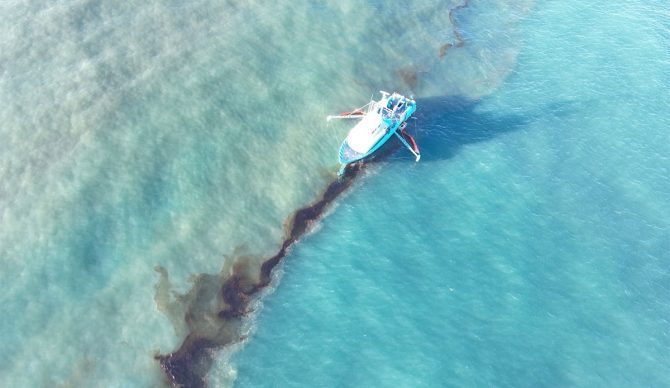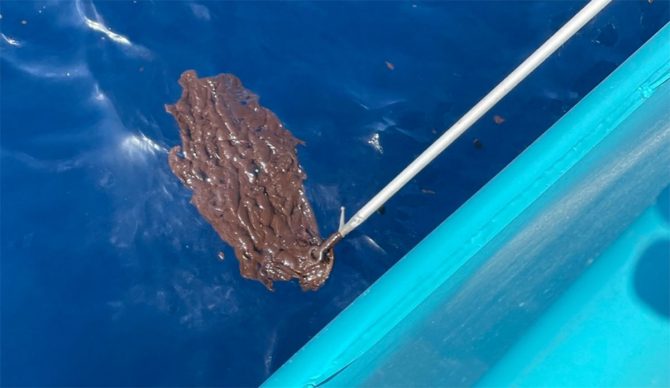
The oil spill in the Gulf of Mexico was first spotted by the US Coast Guard on Friday. Photo: U.S. Coast Guard Heartland/Facebook
According to reports, over a million gallons of crude oil has leaked into the Gulf of Mexico, an area that is already in dire straits for a variety of reasons.
On Monday, the U.S. Coast Guard said that 1.1 million gallons of crude discharged near the Main Pass Oil Gathering (MPOG) company’s pipeline system, just southeast of New Orleans.
“Overflight teams observed visible oil Friday moving southwest away from the Louisiana shore,” the Coast Guard wrote in a press release. “Three skimming vessels are working to recover oil on the surface. On Saturday and Sunday, overflights observed intermittent surface sheens. Additional surface observations are ongoing with two Coast Guard cutters on scene and additional overflights.”
Remotely operated vehicles were deployed on Friday morning, and continued surveys of the pipeline haven’t yet pinpointed the source of the oil as of this writing. “The vehicles will continue to survey the pipeline if weather conditions permit,” the Coast Guard continued. “The Unified Command is working diligently to determine the source of the release.”
The pipeline, which is 67 miles long, was shut down early on Thursday morning, and officials are now very concerned about the potential impact the spill will have on many endangered and threatened species.

A Clean Gulf Associates 95-foot fast response vessel samples crude oil globule approximately 13 miles southeast off the South Pass Louisiana, Nov. 19, 2023. Photo: U.S. Coast Guard Heartland/Facebook
“There are endangered and threatened species in Louisiana waters. Most of the coastal Louisiana is wetlands and marshes, and that’s typically considered really sensitive to oil,” said NOAA’s emergency operations coordinator Doug Helton. “Even if this doesn’t make it ashore, it doesn’t mean that this is an incident that we can just ignore. There are a lot of things that live out in the Gulf.”
In a social media post on Friday, the Coast Guard reported that crews had collected some 210 gallons of an “oily-water mixture,” and aerial photos show enormous oil slicks in the affected area. With the exact location of where the oil was released from, it’s likely that the 1.1 million gallon estimate is on the low end.
“Especially when estimates come from companies,” Matt Rota, senior policy director for Healthy Gulf, told CBS affiliate WWL-TV, “their business interest is to show that the smaller amount is coming out because they are liable for fines.”
We’ll have more on this story as it develops.

